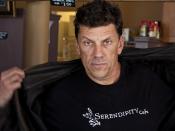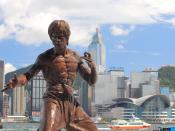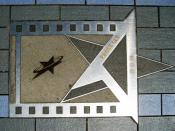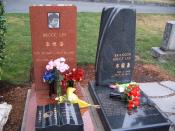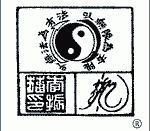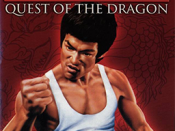Assertiveness derives from assertive meaning: style of behavior is to interact with people while standing up for their rights. Assertive people have the following characteristics: they feel free to express their feelings, thoughts, and desires they know their rights, and they have control over their anger. It does not mean they repress this feeling. It means that they control it for a moment and then discuss it later in a logical way. They have a good understanding of feelings of the person with whom they are communicating. In many aspects of Bruce LeeÃÂs short life he showed assertiveness a great deal and it helped define him as a person. For example as Lee's celebrity grew his martial arts prowess often brought on unprovoked conflicts a number of street thugs, stunt men and martial arts extras, all hoping to make a name for themselves (2006). For the most part Lee defused the challenges without fighting, but at times felt forced to respond to several persistent individuals.
In one incident while filming Enter the Dragon Lee was continually taunted by one of the film extras. The extra claimed as he yelled that Lee was "a movie star, not a martial artist," that he "wasn't much of a fighter." After the barrage of taunts persisted Lee asked the extra to get up from where he was sitting and face him. The extra was a good martial artist from Hong Kong and also was fast, strong, and bigger than Bruce. Lee quickly took the extra apart. After his victory, Lee gave his opponent lessons on how to improve his fighting skills. His opponent, now impressed, would later say to Lee, "You really are a master of the martial arts (2006). In this scenario Lee show his how much of an assertive leader he was and others at the same time. Another example of Bruce LeeÃÂs assertiveness came in 1964 when Bruce was challenged by somegung fu men from San Francisco who objected to his teaching of non-Chinese students (2006). Bruce accepted the challenge and the men arrived at the in Oakland on the appointed day for the face off. The terms were that if Bruce were defeated he would stop teaching the non Chinese. The fight was over in three minutes when Lee pinned the man to the floor and he gave up. After the fight Bruce was extremely disappointed with his performance because he was unable to defeat him in under three minutes (2006).
Dr. Arnold Lazarus, who developed various concepts of assertiveness based on Pavlovian perspective directly or indirectly (Gale, 2001). Dr. Arnold Lazarus defines emotional freedom as ÃÂthe recognition and appropriate expression of each and every effective stateÃÂ (Gale, 2001). He proposed that assertive behavior emerges as that aspect of emotional freedom that concerns ÃÂstanding up for your rightsÃÂ. He further states, ÃÂKnowing what you feel is not enough (Gale, 2001). He felt that one needs to express it too, appropriately. That involves knowing your rights, doing something about it and doing this within the framework of striving for emotional freedom. According to Lazarus, recognition of rights also involves a recognition of, and respect for, the rights of others (Gale, 2001) From Lazarus viewpoint Lee would be the poster child of assertiveness.
References(2006). Bruce Lee Bio. Retrieved June 18, 2008, from The Bruce Lee foundation Web site: http://www.bruceleefoundation.com/Gale, (2001). Lazarus, Arnold Allan . Retrieved June 18, 2008, from bnet Web site: http://findarticles.com/p/articles/mi_g2699/is_0005/ai_2699000528
